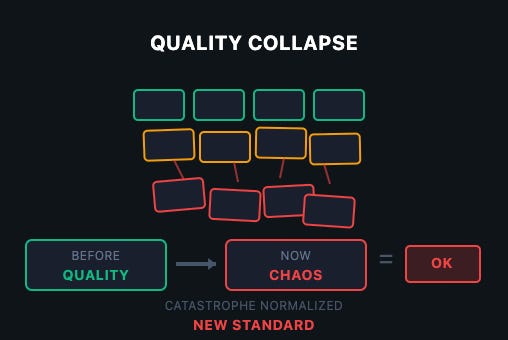- 16 Posts
- 8 Comments

 2·1 day ago
2·1 day agoThe problem for all these things is proprietary firmware.

 1·1 day ago
1·1 day agoWhat are good pocket PCs running linux?
I had a Nokia N900 and now own a Gemini PDA running Sailfish and it is quite nice to have a programmable device wit a physical keyboard (it runs Python, Guile, and cross-compiled Rust CLI programs). A small PC running waydroid would be fantastic.

 3·1 day ago
3·1 day agoThe company’s development and expansion of its services will rely in no small part on massive data center projects, which will require the same amount of energy to operate as New York City and San Diego combined—energy that currently isn’t even available.
In that case, there is a little but fundamental problem. It is based on basic physics: You can fake securities or earnings, or you can print money. But you can’t fake energy because that violates the laws of physics.

 5·1 day ago
5·1 day agoOn the other side of the deal, OpenAI will have to pay about $60 billion per year to fit the bill for the agreement. It currently generates about $10 billion in revenue, which, statistically speaking, is less than $60 billion.
ok.

 2·4 days ago
2·4 days agoFirst interview from him I’ve read in a long time. He comes over as very down-to-earth, honest and humble. And he is not mincing words about his opinion on the AI hype.
Another thing, he confirms something I was worried about, in his comments on parallelism / Python without the Global Interpreter Lock (aka GIL): Some developments in the language serve rather the big companies, than the community and open source projects. For example, lock-less multi-threading in Python serves mostly the largest companies, while having little value for small projects.
Personally, I think this was already visible in the 2/3 transition: It would have been possible to make Python 3 backwards-compatible (as an example, SBCL added Unicode support without breaking compatibility, and in the same way Python’s Numpy was a compatible drop-in replacement for the old Numeric module).
But the dominant Python users were not interested in making Python 3 backwards-compatible. Now, mega-corporations with an overkill of money, or Silicon Valley start-ups which are unlikely to survive their third year, do not need backwards-compatibility so much. On the other hand, smaller community projects and above all the scientific community need it urgently. Just as an example: The Python Wiki is a MoinMoin wiki. MoinMoin was written in Python 2, and the maintainers did so far not have the resources to port it to Python 3. That’s a pity because it is the most, if not the only full-featured and easy to manage wiki software written in Python, and the situation can be seen as an example how the influence of big corporations like Google is killing the open web.
Yes, having programmed bash and its predecessors for 30 years and several lisps (Clojure, Racket, Guile, a little SBCL) in the last 15 years, I very much prefer the Scheme version in this place.
Why?
- This code fragment is part of a much larger system, so readability and consistency counts
- The Guile version supports a more powerful functionality, which is that evaluation of a package can have several extra results (called outputs). It is over a year that I read about that in the Guix documentation and yet I recognize it immediately.
- the code tells me that it is removing examples.
- the code fits neatly into a tidy system of several stages of build and packaging
- the code uses a structured loop. Of course you can do that in shell as well - I am pointing this out because the bash version is a bit shorter because it does not use a loop.
- Scheme has much safer and more robust string handling. The code will not do harmful things if a file name contains white space or happens to be equal to
'echo a; rm -rf /etc/*'. - Scheme strings handle Unicode well
- If there is an error, it will not be silently ignored as is the norm in shell scripts which are not written by experts, but will throw it.
- the code has less redundancy. For example, the bash version mentions three times the subfolder “lib”, the Guile version only once. This makes it easier to refactor the code later.
I’d argue that using Scheme as a configuration language is not such a steep barrier. Any Emacs user has surely done a little bit of configuration setup by pasting bits of configuration statements into a file called
.emacs. Well, the configuration language he or she was using is actually Emacs Lisp. There is no border between configuring Emacs by text file, and writing code in Lisp.











The cycleways in the center of Munich along river Isar are also becoming quite crowded.
But know what? That’s life. We solve a nasty problem, and get a nicer problem or challenge in turn.